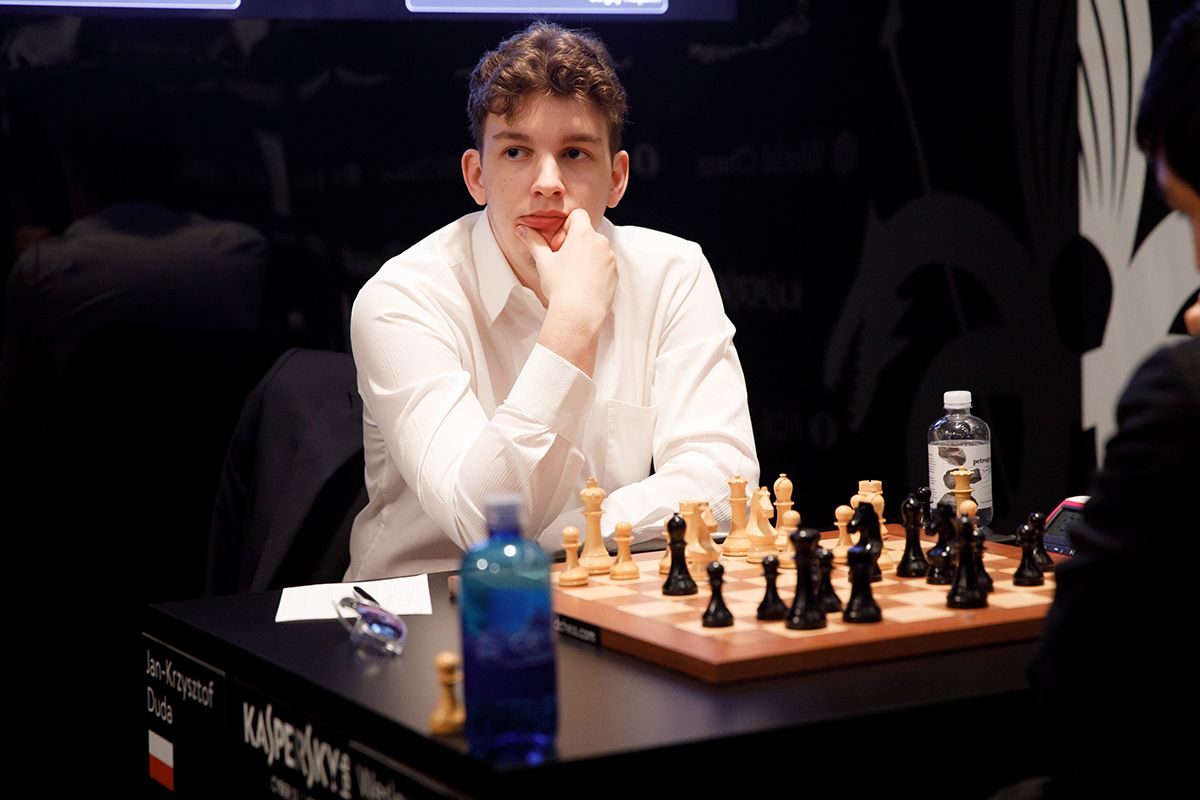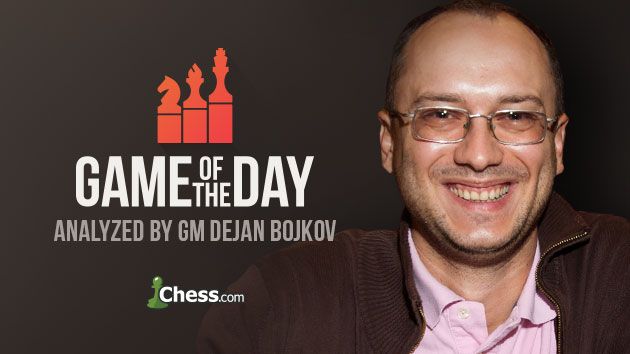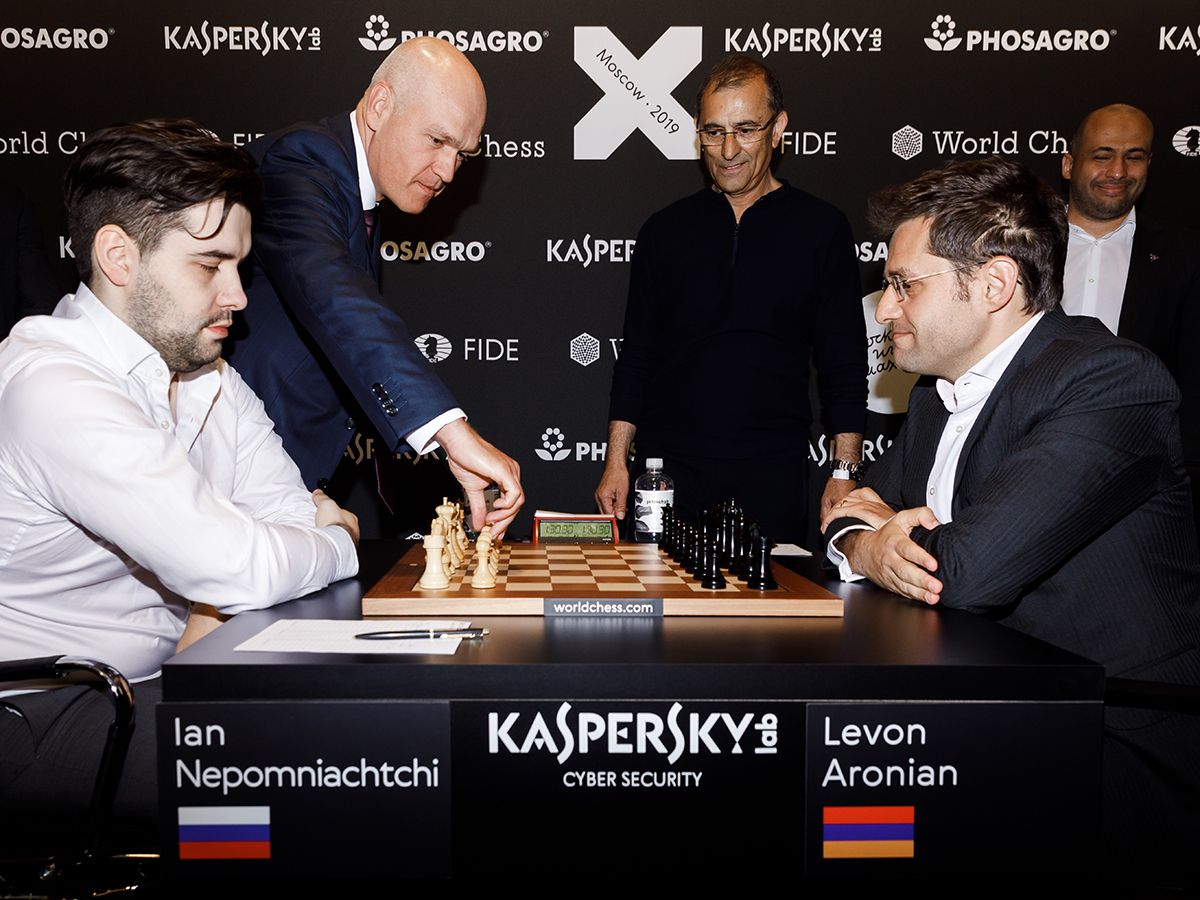
Duda, Nepomniachtchi, Wojtaszek Start With Wins At FIDE Grand Prix Moscow
Polish GMs Jan-Krzysztof Duda and Radoslaw Wojtaszek had a dream start of their FIDE Grand Prix in Moscow as they beat their higher rated opponents Wesley So and Shakhriyar Mamedyarov respectively. Levon Aronian must win on demand as well, as he lost to Ian Nepomniachtchi.
The new Grand Prix tournament format (it's now a knockout; see our preview for details) saw its plusses and minuses on the very first day. On the one hand, there were several quick draws (one in 12 and one in 14 moves!) as especially the white players didn't want to take too much risks as soon as their openings hadn't yielded them much.
It should be noted that FIDE decided that it's fair for the players to have the option to offer a draw in such a knockout format. And so, unlike in many other events these days, the game can be over any moment. Hikaru Nakamura, who had drawn very quickly and who joined the live broadcast for quite a while, predicted 80 percent of the classical games to end in a draw in this tournament.

On the other hand, there was the immediate drama for three players who are already close to being eliminated. Especially for Shakhriyar Mamedyarov the grapes were sour, as he was in fact winning but saw his position turn into a lost one over just a few moves.
"Obviously I was just lost," Radek Wojtaszek readily admitted after the game. "I saw that it was simply hopeless but on the other hand I thought that I had to fight till the end and then maybe I will have some small chances here and there."
His wife, the reigning European Women's Champion IM Alina Kashlinskaya, is supporting him in Moscow where her family lives. She said: "Of course I believe in my husband but at some point I was thinking what to tell him to fight tomorrow!"

Like Wojtaszek, Jan-Krzysztof Duda is skipping the Polish Championship (currently underway) for this more prestigious event, and the youngest of the two fully justified the choice as well. Duda won the first game of the mini match, that was a repeat of both their 2017 Leon and their 2018 Speed Chess matches, after an early mistake by So in the opening.
The American probably mixed up his preparation and then faced the choice between two evils: giving up the light-squared bishop or giving up this pawn on e5. He chose the latter, and soon made another mistake.
"My opponent misplayed it completely; I guess he also forgot about this Bd6 and c5 idea and his bishop on a7 just sucks," said Duda, who noted that he had lost both of the aforementioned matches. "Usually I have a hard time against him unless he just blunders something on one move!"

The third winner was Ian Nepomniachtchi, who brought down Levon Aronian after a long and tough fight. The Russian player was in fact the small favorite here on rating as the world number eight, two places ahead of Aronian on the May 2019 Elo list.
He chose a rare and somewhat drawish line against the Ruy Lopez that involves an early Bxf7+ where Black needs to be a bit precise.
"It was very close to equality and even when I won a pawn it was not much," Nepo said. "The piece sacrifice, I don’t think it was necessary, but it was also a very good chance."
The winner of the game wasn't too happy with his moves in the technical phase, but he managed to win eventually. "In the end I just got lucky."
Aronian: "29...Qe6 was imprecise. I wanted to clarify things but I underestimated that my position is a bit passive. It was bad opening preparation and imprecise play at the decisive moment mainly due to lack of time."


Of the five draws, Teimour Radjabov vs Hikaru Nakamura was the shortest in both time and number of moves. In fact, you can still find 18 moves in the final position.
Even though Nakamura had also played it in Abidjan last week, Radjabov said he got surprised by the move 7...b5 which leads to some forced play. But the Azerbaijani, who is one of the most drawish players in the circuit, was smiling anyway.
"I’m OK with the draws; as I said to Hikaru, it’s anyway decisive here!"
Nakamura noted that unlike in the World Cup, the first round opponent is already very strong in Moscow. "If you make one mistake, normally you just lose and you’re finished."

Sergey Karjakin and Alexander Grischuk played two more moves, and also a few that hadn't been played before. Phew!
Karjakin said he didn’t expect 2…e6, which is opponent rarely plays. "I didn’t get anything out of the opening. I offered a draw because this is one of the few tournaments where it’s possible to offer a draw!"
For the same reason, Grischuk said he was “shocked for 10 minutes” about the draw offer, adding “I didn’t know what to do. It was like a punch under the belt!” About the result, he remarked in his typical dry way: "A draw is better than losing and worse than winning."

The other all-Russian match is in fact an all-St.Petersburg match, among two friends. Nikita Vitiugov and Peter Svidler weren't too happy when they saw the pairings, but both noted that there are no good pairings here.
On the game, Vitiugov said: "The final position is very complicated and in a tournament I would have continued the game but here we play a match so it has some specific strategy. I wasn’t sure about the evaluation of the position so I decided to try and ask Peter about his thoughts."
Svidler: "I didn’t think very long because I thought f4 was the main move in the position and while waiting for Nikita to make it I was pretty sure I was worse, but maybe it’s just me generally not liking my positions, which is my normal state. We discussed the position afterwards and maybe I am not worse at all. My assessment as the move was appearing on the board was that I was in trouble. When the move was accompanied by a draw offer, I thought: that’s a good deal."

Dmitry Jakovenko regularly plays in the Chinese league, and must have been to China at least 10 times. Still, he only faced Wei Yi for the first time, and in his home country. The Russian player had no problems as Black. "I found a forced draw and I didn’t see any reason to decline it."
Wei: "4...d4 was a surprise to me. I didn’t remember much in the game. I tried to examine some interesting lines but he played well and then it was a draw."

Last but not least, Anish Giri vs Daniil Dubov. Dutch chess fans were fearing for Giri's life—especially the ones using an engine that showed a two-pawn advantage for Black at some point. It all started with a rare line in the English, so rare that Dubov had even forgotten his own game with Ivan Cheparinov.
"It was a surprise despite that he played it before!" said Giri. "We got an interesting position but then I started very badly. I thought I was losing, at least practically because I have zero time and Black had the initiative and definitely the advantage.
"I was already thinking about 'how to win as Black tomorrow' but then Daniil blundered something and he offered a draw. I didn’t really understand what he blundered and I had 30 seconds and I didn’t have time to figure it out and I thought OK, it’s fine."

The 2019 FIDE Grand Prix series consists of four knockout tournaments, with 16 players each, who play two classical games per round and if needed a tiebreak on the third day. The other three Grand Prix tournaments are Riga/Jurmala, Latvia (July 11–25), Hamburg, Germany (November 4–18) and Tel Aviv, Israel (December 10–24).
Each of the four tournaments has a prize fund of 130,000 euros ($145,510). Prizes for the overall standings in the series total 280,000 euros ($313,405), making the total prize fund of the series 800,000 euros ($895,444).
The games start each day at 3 p.m. Moscow time, which is 14:00 CEST, 8 a.m. Eastern and 5 a.m. Pacific. You can follow the games here as part of our live portal. The official site is here.
The official WorldChess broadcast of day one with GMs Evgeny Miroshnichenko and Daniil Yuffa.
Previous report:

